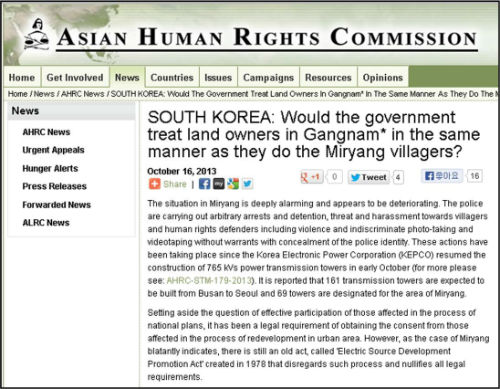이례적으로 재차 성명.. “독재 알리는 강한 경고신호”
아시아인권위원회가 지난 7일 밀양 사태에 대한 인권탄압 규탄 성명서를 발표한데 이어 16일 또 한번 성명서를 발표하고, 이례적으로 한국이 “법치국가가 아니고 권위주의나 심하게는 독재임을 알리는 강한 경고신호임을 보여준다”고 지적했다.
이날 아시아인권위는 공사중단과 주민들의 민주적 참여 보장, 전원개발촉진법 수정을 촉구하는 성명서를를 통해 “밀양의 상황이 대단히 염려스러우며 더 악화되고 있는 듯 보인다”며 “경찰이 폭력을 사용하고 영장도 없이 자기들의 신원을 숨긴 채 무차별적으로 사진을 찍고 비디오 촬영을 하는 등 마을주민과 인권운동가들을 향해 임의적 체포, 감금, 협박, 폭행이 가해지고 있다”고 전했다.
아시아인권위는 “한국정부는 보통 국제 포럼에서 경제 성장의 과정을 예로 들며 한국이 ‘법치’ 국가임을 자랑스럽게 말하곤 하지만 밀양과 강정 마을 사태와 관련하여 한국정부가 보여준 태도를 본다면 이 법치를 단지 법의 관점만 따르는 통치로 보거나 혹은 법치에 대해 잘못된 이해를 하고 있음을 보여줄 뿐”이라고 비난했다.

아시아인권위는 성명서 말미에 “보수적인 정치인들이 현재의 사태에 대해 침묵하면서 밀양 마을의 힘 없는 노인들에게 그들의 건강과 재산에 대한 권리를 포기하라고 요구하는 것은 이 보수주의자들에게 있어 그들의 정치적 성향에 따르면 이러한 것들은 꼭 보호해야할 ‘고귀’한 개념이라는 것을 생각하면 정말 웃기는 짓”이라고 비난했다.
또한, “한국정부가 밀양 마을사람들이 강남지역의 땅 주인이나 주민들이었어도 이들을 같은 방식으로 대했을까?”라고 자문하며 한국 정부의 차별적인 인권정책을 힐난했다. (☞ 아시아 인권위원회 성명 원문 보러가기)
| 다음은 정상추 네트워크의 아시아 인권위원회 성명 번역 전문 SOUTH KOREA: Would the government treat land owners in Gangnam* in the same manner as they do the Miryang villagers? The situation in Miryang is deeply alarming and appears to be deteriorating. The police are carrying out arbitrary arrests and detention, threat and harassment towards villagers and human rights defenders including violence and indiscriminate photo-taking and videotaping without warrants with concealment of the police identity. These actions have been taking place since the Korea Electronic Power Corporation (KEPCO) resumed the construction of 765 kVs power transmission towers in early October (for more please see: AHRC-STM-179-2013). It is reported that 161 transmission towers are expected to be built from Busan to Seoul and 69 towers are designated for the area of Miryang. Setting aside the question of effective participation of those affected in the process of national plans, it has been a legal requirement of obtaining the consent from those affected in the process of redevelopment in urban area. However, as the case of Miryang blatantly indicates, there is still an old act, called 'Electric Source Development Promotion Act' created in 1978 that disregards such process and nullifies all legal requirements. According to information received, if the government plans to make a power plant or a dam and designates a place for such purposes, owners of the land or residents in the area are automatically prohibited to dispose of their property in their wills and consent from them is not a legal requirement. Accordingly, compensation caused by compulsory expropriation is arbitrarily made according to its own regulation which does not reflect the reality. This unjust act has seriously deprived the people of their rights, including the right to property and right to health. In addition, even in a situation where consent from the affected is a legal requirement, there is a tendency of the judiciary to not consider the unjust process of getting consent when the matter is brought before it. The judiciary is often of the view that as long as the formal requirement is met, the legal requirement is considered as fulfilled. When the rights of people come into conflict with the government the courts rule in favour of the government on the grounds that the progress of construction has been already made to the extent that it the natural conditions cannot be restored. The case of Miryang belongs to the former and that of Gangjeong village, Jeju Island the later are good examples of such. The government normally refers to the progress of economic growth at the international forum and are proud of saying that South Korea is a 'rule of law' country. However, what it has demonstrated with regard to dealing with matters of Miryang and Gangjeong is a mere reflection of rule by law perspective or distorted understanding of the rule of law. In a country where any act or rules and regulations which restrict human rights continue to exist without challenge, it is not a rule of law country at all and it often shows an increasingly alarming signs of either authoritarianism, or worse, dictatorship. People deserve better care and treatment from the government rather than being left behind in the name of a national plan and or the law. The government should bear it in mind that the construction of transmission towers in Miryang is only the entrance of such paths of strong struggle from the affected. It should cease the current construction and start constructive dialogue for negotiation with the villagers in a democratic process with effective participation of the affected persons. The legislatures are also urged to lift such articles legally depriving people of rights through careful study and amendment of the Electric Source Development Promotion Act. The Asian Human Rights Commission also urges the government to take immediate steps to ensure guarantees of effective participation of the affected to the national plans. The principle of full participation of the affected to any national plan should be incorporated in all process. It is a mockery that political conservatives remain silent on the current matter and ask for the vulnerable elders in Miryang village to surrender their right to health and property which is the 'noble' notion that the conservatives wish to protect according to their political spectrum. A question remains unsolved by the government: Would the government deal with villagers in a similar manner if they were residents or owners of land in the Gangnam area? *The Gangnam normally refers to an area restricted to persons who can afford luxurious accommodations. |


